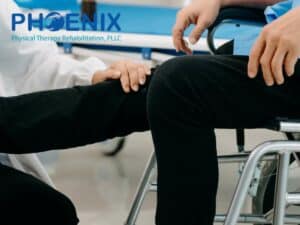Improve Movement, Balance, & Daily Activities
Multiple sclerosis (MS) is a chronic disease that affects the central nervous system. As a result, it can cause a wide range of symptoms that impact movement, balance, and even basic daily activities. Although there is currently no cure for this condition, specialized physical therapy and ongoing medical care can help manage symptoms and improve overall function.
How Multiple Sclerosis Affects The Nervous System

When this layer is damaged, communication between the brain and the rest of the body becomes disrupted, leading to a variety of symptoms. These can include persistent fatigue, muscle stiffness or spasms, difficulty maintaining balance, loss of coordination, numbness or tingling in the limbs, blurred or double vision, and occasional problems with speech or swallowing.
MS is a complex condition that affects each person differently, and it can progress at varying rates. As explained by the Mayo Clinic, multiple sclerosis is classified into different types:
- Relapsing-Remitting MS: This is the most common form. People experience periods of new or worsening symptoms (relapses) that develop over days or weeks and then improve partially or completely. These flare-ups are followed by remissions that can last for months or even years.
- Secondary progressive MS: Over time, about 20% to 40% of those with relapsing-remitting MS may transition to this type. It involves a gradual worsening of symptoms, with or without occasional relapses or plateaus. This progression typically occurs 10 to 40 years after the initial onset of the disease.
Regardless of the form or severity, early intervention with Phoenix physical therapists trained in neurological rehabilitation can make a significant difference in preserving mobility.
Managing MS Through Targeted Therapy
The primary goal of physical therapy for MS is to improve mobility and balance, reduce stiffness, and promote overall well-being. Working closely with each patient, physical therapists design individualized programs that target specific challenges and help patients remain active, independent, and confident in their daily routines.
For example, a typical physical therapy plan may include:
- Therapeutic exercises to strengthen weak muscles and maintain proper joint function.
- Stretching routines that improve flexibility, reduce stiffness, and promote smoother movement.
- Balance and coordination training to prevent falls and improve postural stability.
- Gait training to enhance walking ability and overall mobility.
- Education on energy conservation and proper body mechanics to manage fatigue effectively.
Over time, these combined strategies help patients regain strength and improve motor control. They also boost endurance for everyday tasks, allowing patients to live more comfortably and confidently.
Strengthening & Mobility Exercises
Exercise remains one of the most effective tools for managing multiple sclerosis. A well-structured program helps combat muscle weakness, fatigue, and limited range of motion. The approach depends on the stage of the disease and the patient’s abilities, but most routines include:
- Strength training: Light resistance exercises using bands or weights help maintain muscle tone and support joint stability.
- Balance and coordination training: Targeted movements enhance posture control, reduce fall risk, and boost confidence while walking.
- Stretching and flexibility work: Regular stretching decreases stiffness and promotes better mobility in the limbs and spine.
Physical therapists in Rosedale guide patients through these exercises to ensure they are performed safely and effectively, adjusting intensity as progress is made.
Manual Therapy & Pain Management
For individuals experiencing muscle tightness, stiffness, or discomfort, manual therapy techniques can offer meaningful relief. This hands-on approach involves gentle manipulation of muscles, joints, and soft tissues to restore motion and decrease pain.
Manual therapy helps reduce muscle spasms, promote blood circulation, and ease discomfort. It also helps improve the body’s natural healing process and supports overall relaxation, an important benefit for those managing chronic fatigue and stress associated with MS.
In addition, other joint pain treatments may be incorporated to target specific problem areas. Heat and cold therapy, ultrasound, and electrical stimulation are often used to minimize inflammation and improve muscle function.
The Benefits Of Aquatic Therapy
Below are some of the most notable benefits of incorporating water-based therapy into a rehabilitation plan:
Reduced Joint Pressure & Easier Movement
One of the main advantages of water-based therapy is buoyancy. The water supports your body weight, reduces stress on the joints, and makes movements smoother and less painful. This helps individuals with multiple sclerosis perform exercises that might be too difficult on land.
Gentle Resistance For Strength & Endurance
Aquatic therapy provides resistance without heavy equipment. This helps strengthen muscles, improve endurance, and enhance coordination, all while keeping exercises low-impact and safe. Incorporating additional pain-relief techniques can further support mobility and overall function.
Temperature Control For Comfort & Safety
Heat can trigger fatigue or exacerbate symptoms. The cooling effect of the pool environment helps maintain a comfortable body temperature during exercise, allowing for longer sessions and more consistent performance. This promotes better cardiovascular fitness and flexibility over time.
Alternative & Complementary Therapies
These additional techniques can enhance traditional treatment, promoting flexibility, balance, and relaxation:
Yoga For Flexibility & Mind-Body Connection
Yoga combines controlled breathing, stretching, and mindfulness, helping improve flexibility, posture, and relaxation. For people with multiple sclerosis, yoga can reduce stiffness, enhance mood, and promote a sense of calm and control over the body.
Tai Chi For Balance & Coordination
Tai chi, a slow and fluid practice, focuses on balance, stability, and concentration. Regular sessions can improve motor control, reduce fall risk, and help patients move with more confidence. It’s gentle for all fitness levels, making it an excellent complement to traditional physical therapy.
Kinesio Taping For Muscle Support & Circulation
Kinesio taping involves applying elastic tape to specific muscles or joints, supporting weak areas, reducing pain, and improving blood flow. It can relieve discomfort and aid muscle activation during exercises. When part of a rehabilitation plan, kinesio taping enhances mobility and well-being.
Maintaining an Active & Healthy Lifestyle
Living with multiple sclerosis requires ongoing lifestyle management. Key components of ongoing care include:
Regular physical activity: Short, frequent exercise sessions help maintain function and slow the progression of physical decline.
- Balanced nutrition: Eating a healthy, varied diet supports overall health, energy levels, and proper body function.
- Adequate rest: Getting proper, consistent sleep is essential for recovery, managing fatigue, and maintaining daily performance.
- Mindfulness and stress reduction: Techniques such as meditation or breathing exercises can improve emotional well-being, which is connected to physical performance.
Physical therapists in Dix Hills play a vital role in helping patients create sustainable routines that incorporate these elements safely and effectively.
Regain Your Quality Of Life Now
Receiving a diagnosis of multiple sclerosis is never easy, as it brings many changes to everyday routines. However, with the right support, you can maintain an active and fulfilling lifestyle. Physical therapy, in particular, helps manage symptoms effectively.
At Phoenix Physical Therapy & Rehab, we have a team that understands the challenges of this chronic condition. We work closely with our patients to help them regain the highest possible quality of life, providing specialized care grounded in empathy and respect for their unique situation.
If you or a loved one is living with multiple sclerosis and seeking expert support, you can schedule a consultation with our therapists. They can help you live with less pain and greater confidence. Take the first step toward a better quality of life!
Phoenix Physical Therapy
Dix Hills Location
105 Majestic Dr
Dix Hills, NY 11746
Phone: 347-733-1916
Rosedale Location
23520 147th Avenue, Suite 1,
Rosedale, NY, 11422
Phone: 718-481-3392
Mail: [email protected]
Brooklyn Location
7510 4th Ave., Suite 3,
Brooklyn, NY, 11209
Phone: 347-733-1916
Mail: [email protected]


 Regular physical activity:
Regular physical activity:




